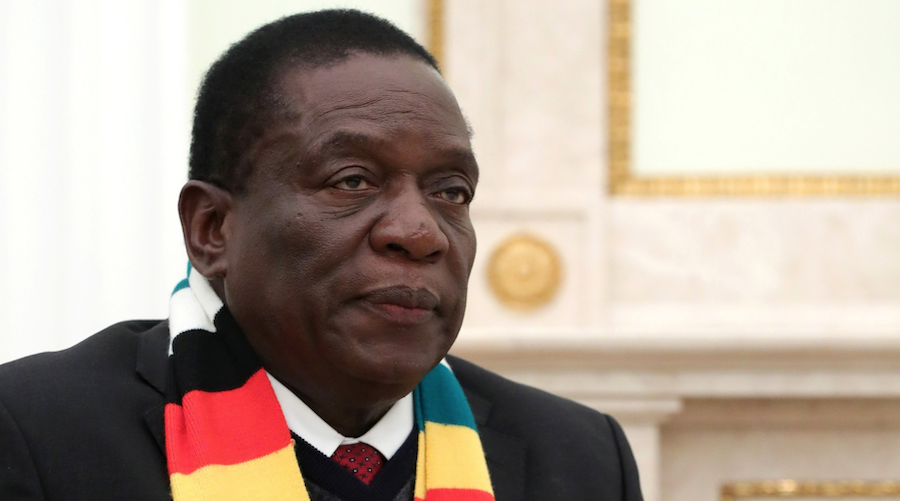Zimbabwe eyes platinum-led revival. Miners see little chance

Zimbabwe’s government is banking on a platinum-mining boom to help revive its collapsing economy. The world’s biggest platinum companies say it isn’t going to happen.
Since Emmerson Mnangagwa took over as leader of the country following a coup in late 2017, platinum projects valued at more than $8 billion have been announced by Cypriot and Russian investors. Still, two decades of political and economic instability and a government with a track record of seizing privately owned assets makes many in the industry skeptical about the new ventures.
“The sort of things being thrown around are all smoke and mirrors,” said Neal Froneman, chief executive officer of Sibanye Gold Ltd., the world’s largest platinum producer, which part owns a mine in Zimbabwe. “It’s not easy to raise capital for all those projects and you have a huge amount of regulatory uncertainty.”
In addition to a history of changing ownership rules, miners are likely to be deterred by Zimbabwe’s failing currency regime that’s caused hyperinflation, chronic shortages of fuel and power and U.S. sanctions on government officials and companies. The southern African nation is facing the first contraction in gross domestic product since 2008.
Insurmountable hurdles
While record prices for sister metal palladium are buoying the market, the longer-term outlook for platinum remains uncertain, making it difficult to justify expensive capital investments, said Nico Muller, CEO of Impala Platinum Holdings Ltd. The new investors face “insurmountable hurdles,” he said.
Implats, which produces most of its platinum in South Africa, owns the biggest mine in Zimbabwe and has previously had concessions seized and given to other investors.
Still, Zimbabwe has the world’s third-biggest deposits of platinum-group metals after South Africa and Russia and the shallow depth of its deposits makes mining cheaper and easier than in neighboring South Africa, the site of the biggest deposits. The government has ambitious mining plans.
Still, two decades of political and economic instability and a government with a track record of seizing privately owned assets makes many in the industry skeptical about the new ventures
The country’s mines ministry earlier this month forecast platinum-group metals output at 2.79 million ounces in 2024, almost triple the 979,000 ounces currently produced by Implats, Sibanye and Anglo American Platinum Ltd.
Almost half that target production will come from a $4.2 billion mine being built by Cyprus’s Karo Mining Holdings Ltd. Karo is 26.8% owned by Tharisa Plc, a publicly traded South African platinum and chrome miner run by the Pouroulis family. Tharisa has the right to acquire the rest of the Zimbabwe project.
A second $4 billion project is being developed by Great Dyke Investments, a venture between Russia’s Vi Holding and Zimbabwean investors. Great Dyke has appointed African Export-Import Bank to raise $500 million to fund the first phase of a mine that will produce 290,000 ounces of platinum-group metals by 2023.
The project, which was until recently part owned by companies linked to the Zimbabwean military, expects to start construction on a processing plant in April, said Great Dyke CEO Alex Ivanov. The venture is also in negotiations with potential equity partners, he said.
The new investors haven’t raised concerns about Zimbabwe’s risk, said Mazai Moyo, secretary for the ministry of mines.
Still, to ensure a mining renaissance, the government will need to convince big producers to start spending, said Charles Laurie, head of country risk at Bath, England-based Verisk Maplecroft. That will require substantial revisions to the nation’s mining code, he said.
“If the Zimbabwe government is serious about attracting credible, well capitalized, A-list mining investors, it needs to do much more than give mining regulations a facelift,” Laurie said. “Investors want speed to capitalize on the very substantial opportunities, but they also need stability and clarity.”
For the moment, Implats and Sibanye remain to be convinced about Zimbabwe, with both diversifying their investments through acquisitions in North America. Sibanye bought Stillwater Mining Co. for $2.2 billion three years ago, while Implats earlier this month agreed to pay $758 million for North American Palladium Ltd., in its first move out of southern Africa.
“Maybe when the sanctions are lifted, and there is a real commitment from government in terms of rules of investing there, it might be a great place to do business,” Froneman said.(Updates with ease of mining in seventh paragraph)
(By Felix Njini and Antony Sguazzin, with assistance from Godfrey Marawanyika)
{{ commodity.name }}
{{ post.title }}
{{ post.date }}




Comments